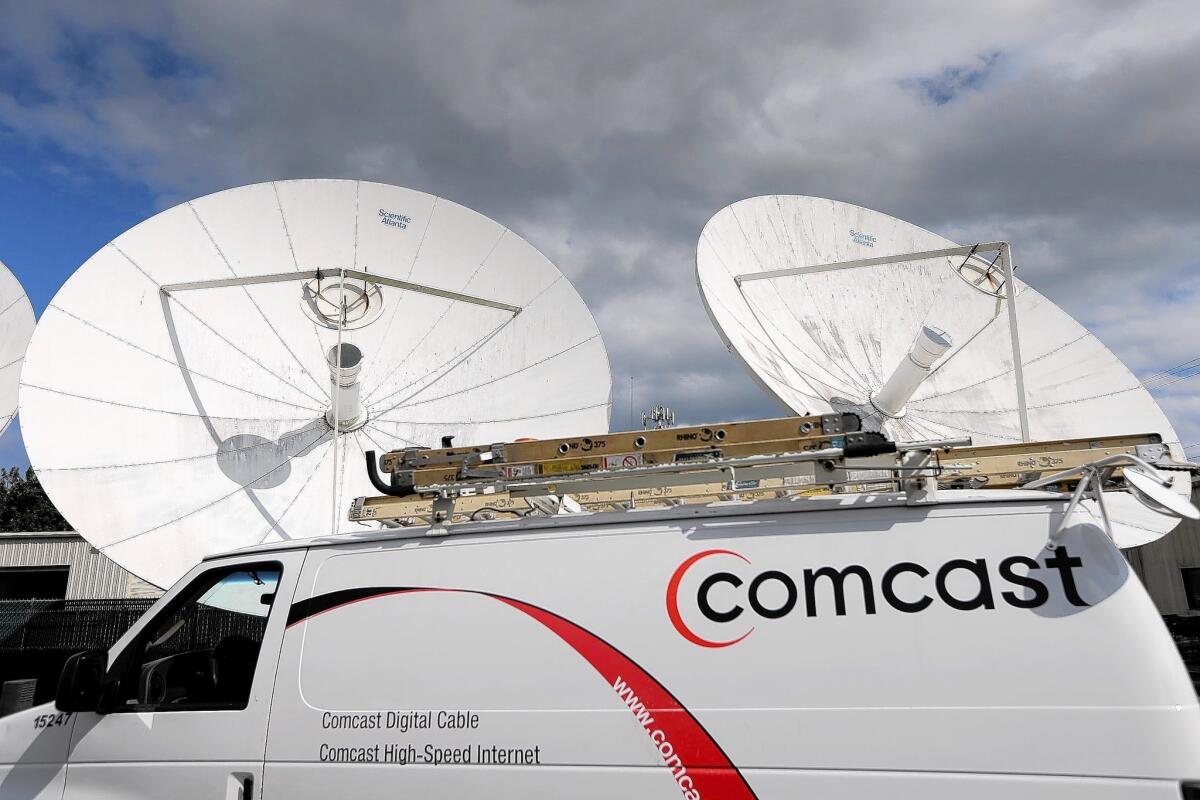Comcast investor meeting draws protest

- Share via
Comcast Corp. was hoping to focus on its financial achievements and the benefits of its proposed takeover of Time Warner Cable during its annual shareholders meeting.
Instead, the company Wednesday was taken to task by consumer advocates and some customers who believe the cable giant already is too big and powerful. The proposed $45-billion acquisition of Time Warner Cable Inc., they said, could hurt customers who are already grappling with high prices and sometimes sluggish customer service.
There was even a small protest outside the 75-minute meeting held at Philadelphia’s Kimmel Center for the Performing Arts.
“So many people around the county dislike this plan to allow Comcast to gobble up so many more customers, including in major markets like Los Angeles,” Hannah Sassaman, who helped organize the protest, said following the rally.
Consolidating 7 million of Time Warner Cable’s subscribers would give Comcast more than 40% of the U.S. high-speed Internet service market. Sassaman and other activists contend that would allow Comcast too tight a grip on the nation’s information highway.
Media consolidation has accelerated this year with Comcast’s bid to buy Time Warner Cable. Earlier this week, phone behemoth AT&T Inc. unveiled its $49-billion deal to acquire one of Comcast’s main competitors, satellite TV giant DirecTV.
Both the AT&T-DirecTV deal and the Comcast-Time Warner Cable transaction must be approved by federal regulators.
Comcast Chairman and Chief Executive Brian L. Roberts told investors at the meeting that their acquisition of Time Warner Cable would be beneficial.
“We think this is bringing together two great long-standing cable companies who operate in different markets,” Roberts told shareholders. “To have those [Time Warner Cable] markets joined with our world-class suite of products will enable us to continue to innovate and grow our company.”
He said Comcast had started 2014 “with the best momentum in the company’s history.”
Inside the meeting, a handful of shareholders took the opportunity to criticize Comcast. Only one of about 10 speakers mentioned the Time Warner Cable merger as a concern.
Several members of a Chicago branch of the International Brotherhood of Electrical Workers union traveled to Philadelphia to call on Roberts to resolve a lengthy and bitter contract dispute.
They demanded that Comcast significantly increase the pay of technicians in Chicago who respond to service calls.
Two of the technicians told Roberts, whose compensation topped $30 million last year, that in three hours he earns the same amount of money than they make in an entire year.
“We can have a great company, but it’s time, Brian, to do the right thing,” one of the workers said.
One Pennsylvania investor complained about customer service but said the situation had improved. The man praised the efforts of a Comcast technician dispatched to his house to fix problems as well as a Comcast representative named Doug who had been patient and helpful.
“Without him, my wife and I would be pulling our hair out now,” the man said.
Indeed, Comcast has stepped up its campaign to be more responsive. Engineers have installed easy-to-navigate customer service features, including the ability use a smartphone or computer to check account balances and report service outages.
Managers have increased customer service training and shortened call-back times so customers do not have to endure lengthy waits on hold on the phone to speak to a representative.
“We have set as our No. 1 priority to improve customer service,” Roberts said.
He added that 42% of its customers now use the self-service features, resulting in a reduction of 20 million calls a year to deal with questions and service problems.
During the meeting, shareholders reelected Comcast’s board members — including Roberts — and ratified the compensation packages provided to top executives.
Investors, however, rejected three proposals from shareholders that did not have the support of the company. One included a request by the Episcopal Church that Comcast provide greater detail on its government lobbying efforts and strategy.
Comcast employs 130 lobbyists and spent nearly $19 million on lobbying efforts last year, according to the Center for Responsive Politics. It ranks among the nation’s top corporate spenders.
Roberts controls 33.3% of Comcast’s voting stock, which gives him considerable sway over the company’s decision-making.
Comcast shares closed up 70 cents Wednesday to $51.35 a share.
Comcast shares have fallen 8% since February, when the Time Warner Cable deal was announced.
More to Read
From the Oscars to the Emmys.
Get the Envelope newsletter for exclusive awards season coverage, behind-the-scenes stories from the Envelope podcast and columnist Glenn Whipp’s must-read analysis.
You may occasionally receive promotional content from the Los Angeles Times.








